CES 2020: The Wows and the Whys in Health Tech Innovation

The 53rd edition of the Consumer Electronics Show (CES) is officially underway! With over 4,400 exhibiting companies from industries ranging from gaming to digital health showcasing their latest products and technologies, you might need some assistance to stay afloat in the flood of new announcements. Donning our rescue caps, The Medical Futurist team is coming to your aid! We’ve compiled the most exciting (and questionable) CES news relating to digital health that we’ve found at this year’s show. Let’s take a look!
The Wows
Every year at CES, companies come up with promising technologies, some just merely concepts, while others just a few months from mass market release. While there are loads of new tech worthy to take a look at, in this section, we’ve compiled those that really standout and hold promise to advancing the digital health agenda and making patients the point of care. At this year’s CES, some 9 innovative techs wowed us like a smart scale with a twist, a gamified physical rehab therapy for stroke patients and a tricorder-like muti-functional medical Swiss knife with telemedicine possibilities. Let’s look at them all in more details!
1. ScanWatch by Withings: ECG & sleep apnea detection from your wrist
Make way Apple Watch, there’s a new competitor on the market! Withings presented its upcoming ScanWatch at this year’s CES and wowed us with its ECG and sleep apnea detection abilities. The company is calling it the world’s first and only clinically tested watch to combine medical grade electrocardiogram and sleep apnea detection. However, the ScanWatch looks far different from a medical device with its classic watch look. Flipping the device over will reveal its more health-oriented features with the combined heart rate and SpO2 sensor, 3 electrodes, and an altimeter. Moreover, the ScanWatch can last up to 30 days on a single charge.
The small circular screen displays notifications, heart rate parameters and oxygen saturation levels. Its PPG sensor continuously measures the wearer’s heart rate and can also detect atrial fibrillation. The built-in SpO2 sensor perpetually measures oxygen saturation levels in order to identify sleep apnea risk. Of course, those results can be shared with a medical professional, and since the sensors are themselves of medical-grade, vital information can be gathered.
Withings’ ScanWatch is slated for a Q2 2020 release and is priced at $249 for the 38mm version and $299 for the 42mm version. And we’d love to give it a spin!
2. Mateo smart bath mat: smart scale with a twist
An honoree of the Health & Wellness CES 2020 Innovation Awards, the Mateo smart bath mat brings quite the innovative approach to the concept of a smart scale. Featuring the innocuous look of a regular mat, without any displays, the Mateo nevertheless monitors your weight, posture and body composition. How do users read their measurements? Via the companion app of course, but the twist that Mateo brings is that you check the readings at your convenience, without the stress of having to know your exact weight or if you’re straying away from your goals because of that extra Christmas Yule log slice you had. The app will simply alert you if you’re on the right track or not.
However, you can also see the exact measurements at any time should you need to. The mat’s sensors will measure weight, muscle, bone and fat mass, hydration, pressure footprint, balance and posture, which can subsequently be analyzed .
“Many people have complicated feelings about knowing their weight. They know it is an important metric to track, but don’t want to start their day frustrated over even slight weight gains, and would rather lose the data point than step on the scale,” said Lenny Dehan, CEO of Mateo. “Our mat is the bathroom’s new secret weapon for improving health. Anyone can capture a host of data any time they stand on the mat, and can get to know that data immediately, check it later, or simply let Mateo alert them when they’ve hit meaningful thresholds. Because the data is tracked over time, and because it is stress-free to use Mateo, it is easier to see the trends and correlate them with fitness efforts so users can see the benefits or make adjustments as needed.”
3. Neofect Smart Balance: gamifying physical therapy for stroke patients
Neofect is a company that specializes in making clinically-proven devices to help in the rehabilitation of stroke patients and it does so by pairing its exercises with games. Its latest product, which the company showcased at CES, is the Neofect Smart Balance. This medical device monitors the users’ motions when they move in tandem with a game, which CNET aptly compared to the Dance Dance Revolution game. While the patients are playing the game, the game will up its challenge by increasing the speed of movement, which will require more coordination, thereby adapting to the rehabilitation process as it progresses. Therapists can subsequently analyze and adjust the therapy with the reports obtained after every gaming/therapy session.
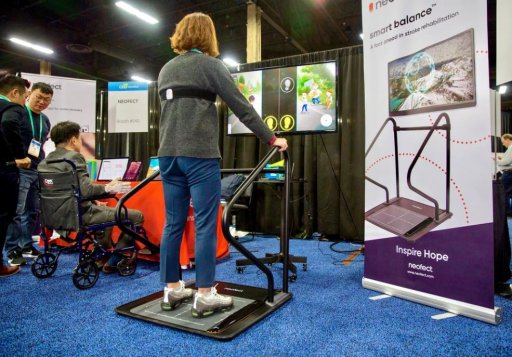
4. MedWand: inching closer to Star Trek’s tricorder
With its myriad of vital parameter measurements and telemedicine potential all in a handheld device, it’s no wonder that the MedWand was an Honoree at the CES 2020 Innovation Awards. This user-friendly device packs a stethoscope, a thermometer, an electrocardiogram and seven other diagnostic devices, providing real-time collection of multiple vital parameters, which can be interpreted by doctors anywhere in the world via the remote video chat it offers.
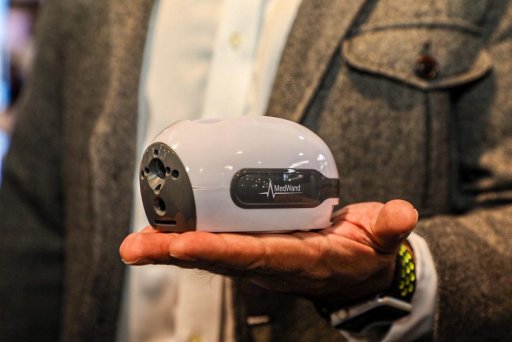
It does sound sci-fi and Star Trek-y, but the MedWand is not merely a concept. The device is expected to be released in mid-2020 in the U.S. at around $399.
“This is the future of health care,” Dr. Samir Qamar, CEO of MedWand, told USA Today. “There will come a time when you get sick, you’ll have this sitting next to your computer, make an appointment online, and the doctor can examine you without you ever having to leave your house.”
5. IEVA Time-C: a smartwatch for skin care
If you want to feel young and look young, the Time-C smartwatch by IEVA might be what you’re looking for. On top of monitoring your heart rate and activity, this fancy-looking smartwatch monitors ambient temperature, humidity, sun exposure, luminosity, noise, indoor and outdoor pollution levels. All of these measurements are aimed at providing information about environment parameters which could influence skin health and aging.
“There are many ways in which pollution affects the skin. It can cause the skin to become dehydrated, clogged, sensitive and irritated as well to be less supple, tone and radiant,” Jean Karam, chairman and CEO of IEVA, told MobiHealthNews. “This is where Time-C can help. The device monitors environments to provide users with insights into their surroundings and their impacts on their health, wellness, skin and more. The technology also uses this information to provide users with recommendations, tips and tools they can use to combat pollution and their surrounding elements.”
6. Elvie: breast milk analysis? There’s an app for that!
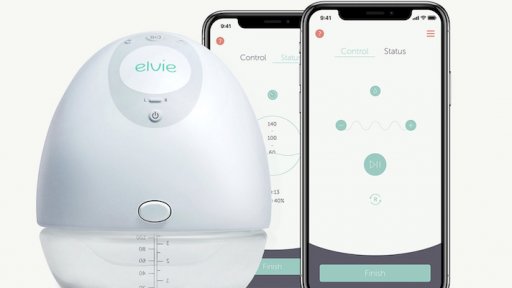
FemTech firm Elvie presented a handy add-on to its existing line of smart breast pumps. These silent wearable breast pumps were even named a CES 2019 Innovation Honoree. The free app gives users details about the milk volume, milk flow, and the pump session time. Elvie also noted that they plan future app updates with additional longitudinal pumping data analyses.
7. Lumi by Pampers: the all-in-one baby monitoring kit
Parenting gets a digital health boost with the Lumi by Pampers. Not only does this kit feature a camera that monitors your baby in HD, tracks sound, temperature and humidity, but it also comes bundled with an activity sensor that attaches to diapers to monitor your baby’s sleep patterns. Via the connected app, parents can be more informed about their baby’s needs regarding sleep, feeding and diapering patterns.
“Figuring out your baby’s needs can be tricky,” said Omer Sher, Head of the Start-up Pampers team who founded the product. “When developing Lumi, we focused on solving real problems parents have. Lumi lets you see and know how your baby is doing right now at a glance, anticipate their needs and build your rhythm as a family.”
8. Grapheal: continuous wound monitoring for individual assessment
France-based company Grapheal came up with a smart patch for continuous monitoring of wounds. This wearable, non-invasive patch is designed to measure and store bio parameters of chronic wounds for subsequent individualized assessment. Through its companion app, caregivers can remotely monitor one’s wound healing progression, be notified of any early-stage infection and thereby prevent complications.
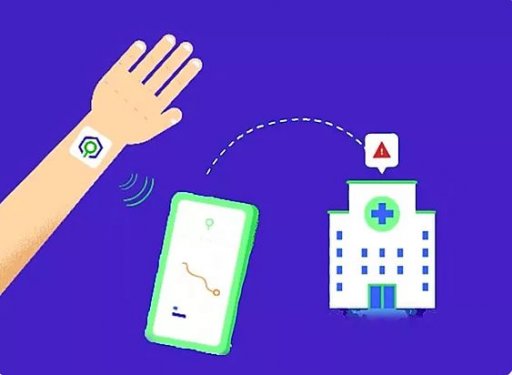
Moreover, this smart patch’s graphene core can stimulate wound healing. Its flexible properties also make it versatile to any wound shape, and thanks to the graphene electrode, it is highly sensitive to even the slightest change in wound parameters.
9. Tech for Multiple Sclerosis patients
Multiple Sclerosis (MS), the most common autoimmune disorder of the central nervous system, is a condition where the communication within the nervous system is disrupted due to damage. The condition can manifest with a variety of symptoms affecting the physical and mental capacities of those affected.
Patients with MS’ mobility can be highly impaired, but thankfully there are technologies that can help address this issue. The iLiving V8 Foldable Mobility Scooter, an Honoree of the CES 2020 Innovation Awards, with its lightweight and tool-less folding capabilities addresses MS patients’ needs. Another company, WHILL, also showcased its mobility scooter during the event.
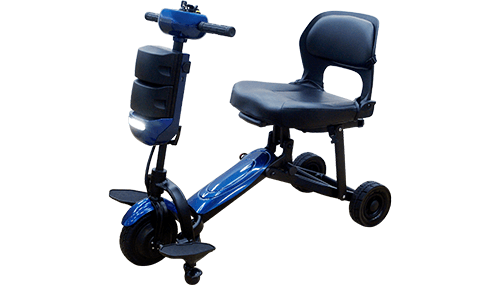
Other physiological aspects that MS affects are balance and posture. To help monitor these, devices like the aforementioned Mateo and the Zibrio SmartScale can come to patients’ and healthcare professionals’ help. The latter even gives a fall-risk level, offers personalized insights and help users improve their balance.
The Whys
Just like we are wowed by a lot of innovative tech, we are also left scratching our heads during the presentation of many products at every CES edition. This year was no different and we’ll take a look at those announcements that kept us asking “Why?”.
1. iKuddle: the AI-powered… litter box!?
A.I. is a truly revolutionary technology that The Medical Futurist believes will bring the real era of the art of medicine. However, the technology isn’t only meant to come to the aid of us Homo sapiens but also to that of our four-legged companions, as pet-centric AI Internet of Things (AIoT) peripheral maker iKuddle wants you to know.
The company presented the iKuddle Auto-pack Smart Litter Box at CES 2020, a smart cat litter box that has self-cleaning and auto-packing features, freeing humans from the task of waste scooping and delegating it to an A.I. These features and even more can all be controlled via the companion app. If you’ve ever wanted a feline pet without the need to scoop the poop, this device is your saviour!
2. Charmin products for a charmingly “smart” toilet
Ever been on the toilet and found out that there’s no toilet paper? Well, Charmin came up with the RollBot, a solution that’ll save you from cursing the previous toilet occupant. This self-balancing robot will come to your aid in your time of need simply by calling it from the phone app (because of course you’re more likely to carry your phone than an extra roll of toilet paper when going to the toilet). The bear-faced robot will come rolling to the rescue in mere seconds, provided that the toilet door is open and that the RollBot won’t have to climb stairs.
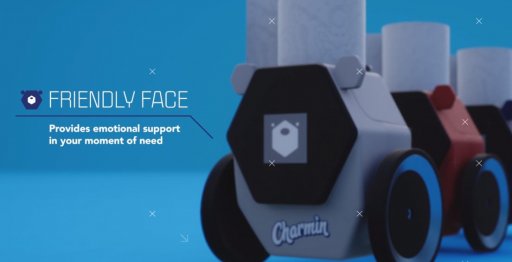
Another charming product from Charmin presented at this year’s CES is the SmellSense. This sensor can detect the carbon dioxide or hydrogen sulfide levels in the toilet room’s air proportional to the previous occupant’s leftover stench. Its display will warn you about whether you should expect to pinch your nose from the toilet’s stench or you have the green light to do your smelly business on the throne.
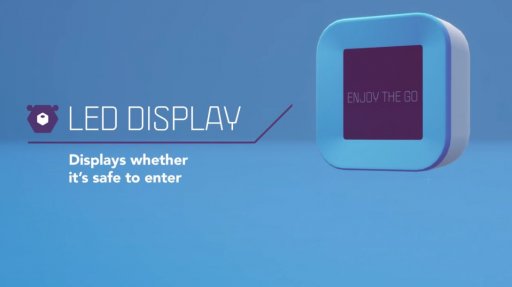
3. A baseball cap that’s so cool it packs an AC
Entrepreneur Steve Feher has had it with scorching summer heat and presented the world’s first Air Conditioned Baseball Cap at CES. Using thermoelectric technology to generate cool air 12 – 22º F below the ambient temperature, this cap can seriously cool your hot head when working outside, hiking or whatever you do in the sun. That is it, provided that you’re willing to have your skull do some workout with the hefty 800 grams prototype cap and battery pack. Whether you decide to get one when (if) it is released or not, you could be cool, but you literally can’t be cooler than someone with an AC cap.
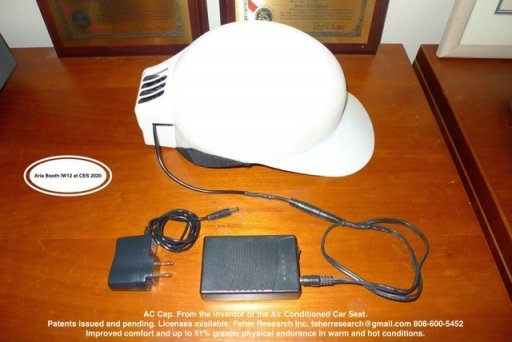
4. Umay: a device to rest your eyes by… doing nothing
If you’re reading this, you’re most likely staring at a screen, which most of us do for more than 10 hours per day. Spending excessive amounts glued to a screen has been linked to disrupted sleep habits and the all too common eye strain. If there’s an issue, there’s a market for profit and Umay wants to cash in on your excess screen time.
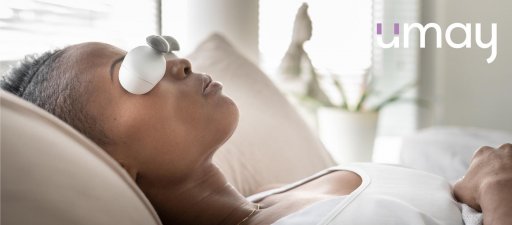
The company brought its Umay Rest device again this year, which features Thermal Meditation and a couple of other gimmicks to help rest your eyes and improve sleep by having you use the device when lying down or even while you sleep. This basically means resting your eyes by having you do nothing while the Umay Rest device sits on your eyes. Well, if you can afford to shell out some cash instead of timing yourself for some off screen time, why shouldn’t you?
The post CES 2020: The Wows and the Whys in Health Tech Innovation appeared first on The Medical Futurist.
